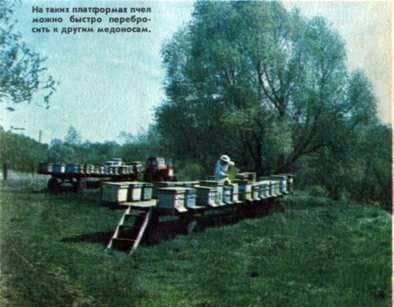
On a summer clear day, bees can be watched with unflagging interest from morning till night, without departing from the hive. Look at how hard they work on flowers, collecting food, how they hurriedly leave their nest and come back loaded with prey. The beehive seemed to be boiling. It’s time for the main honey collection, when the bees gather abundant harvest, the evening drizzle of bees, the fragrance of the apiary, all this makes a strong impression.
And look into the nest of bees. There you will see a lot of wonderful things. It is worth to follow at least one bee – how it behaves – and you will make for yourself many unexpected discoveries. Here, hastily, pushing the others, as if she had no time, the bee climbs upwards with two fiery lumps on the hind legs. She misses the honeycombs in which the larvae lie, passes honey-filled, even empty ones. Where does she aspire to?
Almost on the edge of the honeycomb it stops, drops its weight into the cell, next to the one in which the colored lumps are already lying, and leaves its burden. How clever and quickly she got rid of the load! Why did not I put it in the empty cells that came across her on the way? How did she know where the pollen warehouses are? After all, all this is not accidental.
The oldest Russian beekeeper, NM Vitvitsky, rightly said: “Nature has accumulated so many objects in the dwelling of bees that you can not be surprised at. At least you visited bees every day for a century, but you will see or hear at any new visit to their dwelling “something new that you have not seen or heard.”
Since the bee became a human companion, she invariably attracted his attention. This wonderful insect was studied and studied by naturalists, philosophers, biologists, chemists, doctors, poets.
The famous ancient Greek philosopher Aristotle, the great English scientist Darwin, outstanding Russian chemists Butlerov and Kablukov, many prominent figures of world science and culture paid tribute to the bee.
For academician Alexander Mikhaylovich Butlerov, beekeeping was first a simple, but quite a passion, then he took them seriously as a practitioner and theorist and eventually headed beekeeping in Russia. Butlerov began to publish the first in our country beekeeping journal “Russian beekeeping leaf”, he wrote books on beekeeping available for ordinary peasants.
From overseas trips, he always brought bees of different breeds, which in Russia were not bred. At his apiary, Alexander Mikhailovich tested beehives of all kinds of designs, looked for the best methods of caring for bees. Beekeeping was for the scientist a second vocation. AM Butlerov entered the history of science not only as a great chemist, but also as an outstanding beekeeper.
He passionately loved bees and admired them the ingenious Russian writer Leo Tolstoy. In Yasnaya Polyana, two or three kilometers from the house, there was his small apiary, surrounded by thickets of yellow acacia. She was for him a favorite place of rest and pleasant physical work. On warm spring and summer days, he usually disappeared in the apiary. He himself performed all the apiary work, even made frame hives.
Lev Nikolaevich especially loved the swarm time, when the bees multiply. He could accurately determine when the family would swarm, he would shoot swarms – new young families, put them in hives. “I became an avid beekeeper,” the writer admitted with pride.
When you are in Yasnaya Polyana, try to visit the bees, where Leo Nikolayevich spent many happy minutes. This corner is now called “Old apiary”. Before you will open another interesting page of the life of the great writer.
Much has been written about the hardworking bee of poems and fables by poets of different times and peoples, serious philosophical treatises, scientific articles and books. Still, honey bees continue to remain a mystery of nature.
Bees and beekeeping are attracted to people of different ages and professions. And not only in rural areas, but also in cities. They are pensioners and schoolchildren, collective farmers and workers, teachers and doctors, scientists and writers.
Care of bees in small apiaries is an active rest. It improves health, strengthens the human body, increases efficiency.
In bee language.
Naturalists, scientists and beekeepers have always been struck by the harmony of the life of honey bees, the cooperation of individuals, their mutual aid, the unusual order in the nest, where everything seems to be thought through to the minutest detail and all members of the community are guided by laws that are understood only by them alone and for them sacred. How, then, is such a high level of organization maintained in the many thousands of insects? How do they “agree” with each other?
The mutual relations of the members of this mysterious country of insects for a long time, up to our days, remained a mystery. Now, to some extent, the complex language of honey bees has been deciphered, which every bee understands from the day of its birth. It is the language of sounds, smells, movements.
Пособие начинающему пчеловоду. Лечение пчел щавелевой.
Young Beekeeper